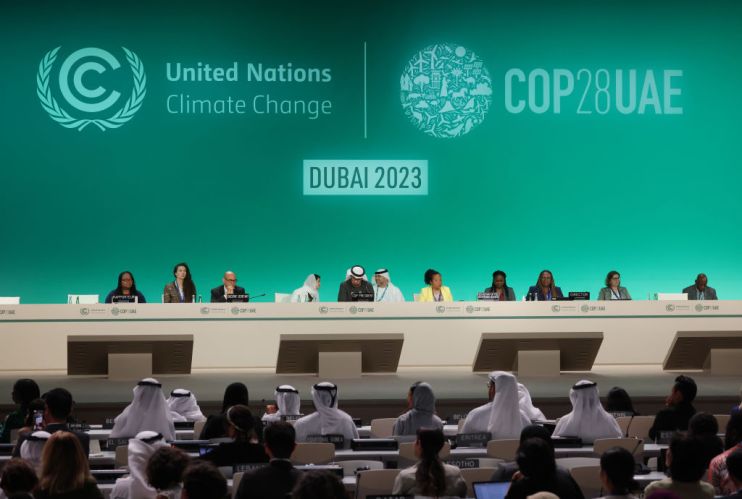Climate nerds to tech execs, how Cop28 became the new Davos

From bad pick up lines from sustainable fashion founders to fossil fuel firms, Cop28 has become the summit to be seen, writes Robyn Scott
Here at Cop28 in Dubai, I attended a “nightcap” hosted by two of the world’s largest corporations – just one of dozens of networking parties across the city’s gleaming hotels and swanky nightclubs taking place as part of the climate conference. The event was packed. “Nice dress,” someone said as I edged sideways through the crowd. After this unsubtle pick up line, he proceeded to describe his large sustainable fashion business, though he seemed uninterested in whether my dress was sustainable.
There’s a distinctly Davos-by-Dubai vibe to the whole event this year, including the parties. A famous climate negotiator and the heads of two giant multilateral organisations were chatting to a few celebrities, encircled by business leaders. Watching them, the chief executive of a well known global NGO remarked on what she saw as the biggest shift between Cop26 in Glasgow and this year’s event. “I’m interested in the presence of business,” she said. “They’re here, and they’re engaged.”
From relatively niche beginnings it now seems the climate summit is for everyone; the more sceptical say it has become more of a trade show than a climate event. It’s correct to be wary about this, especially when it comes to business and the risk of swaying the debate towards short-term stock price geared goals. As has been widely reported, there may well be some objectives by businesses and governments alike which run in direct opposition to the good work of so many. But even with this in mind, it’s better for everyone to be in the room – for government, business and civil society to be talking to each other. Climate change is everyone’s challenge, so it needs to be everyone’s business.
It also needs to be part of everyone’s job, and nowhere more than in government. In a 2023 survey by Apolitical, the online learning platform for governments I lead, 68 per cent of public officials said that climate change was already affecting their work. A further 82 per cent of these thought the effects would get worse or much worse in the next five years. The need for speed is clear.
Another theme is that money no longer represents the overwhelming barrier, with training and skills a new focus. Speaking at an event I co-hosted, Andrew Steer, president and CEO of the Bezos Earth Fund, said: “One of the great things about this Cop is that for the first time we are starting to understand the importance of people.” Secretary Wade Crowfoot, California’s natural resources secretary, put it more bluntly: “We’ve got an implementation crisis.”
And this shows in the data. Despite climate being a challenge that cuts across government, 65 per cent of public officials tell us they have never received any training on the topic. This, it is not hard to see, is a problem. Understanding the basics of climate change is something we should all strive to do, but for our leaders, understanding not only the basics but its strategic implementations, is an obligation.
As someone who has devoted much of my career to supporting governments as they tackle the world’s toughest challenges, I share the frustration with the slow progress on cutting emissions.
But I am also optimistic about the opportunity to accelerate action now we’re beginning to take the skills gap seriously, especially in government. At our event this past weekend, representatives of 10 government bodies, including Brazil, Canada, the UK, and the UAE, pledged to do much more to train public servants on critical climate and nature topics. It’s not enough, but it’s a start – and it will matter.